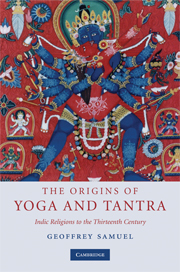Book contents
- Frontmatter
- Contents
- List of figures
- Preface
- 1 Introduction
- 2 Stories and sources
- PART ONE MEDITATION AND YOGA
- PART TWO TANTRA
- 9 The classical synthesis
- 10 Tantra and the wild goddesses
- 11 Subtle bodies, longevity and internal alchemy
- 12 Tantra and the state
- 13 The later history of yoga and Tantra
- 14 Postlude
- References
- Index
14 - Postlude
Published online by Cambridge University Press: 05 June 2012
- Frontmatter
- Contents
- List of figures
- Preface
- 1 Introduction
- 2 Stories and sources
- PART ONE MEDITATION AND YOGA
- PART TWO TANTRA
- 9 The classical synthesis
- 10 Tantra and the wild goddesses
- 11 Subtle bodies, longevity and internal alchemy
- 12 Tantra and the state
- 13 The later history of yoga and Tantra
- 14 Postlude
- References
- Index
Summary
In this final chapter, I reflect back on some of the material in the book as a whole. I begin with the whole question of meditation, yoga and mind-body processes, which has been central to this book. What do we make today of these techniques, which are, as I noted in my introduction, rapidly becoming a significant part of contemporary global society, if often in much modified and adapted versions? Such techniques are of course not unknown in other societies, and can generally be classed, in Foucault's phrase, as ‘technologies of the self’. Foucault introduced this term to refer to methods by which human beings act upon their minds and/or bodies (perhaps we should speak more generally of the mind-body complex) with the intention of bringing about transformations of some kind (Foucault 1988a, 1988b; cf. Samuel 2005a: 335–7). Indic societies appear to have been particularly rich in these techniques, at least as compared to other large-scale literate cultures, and to have seen them as bound up with the acquisition of some kind of liberating insight. I begin then by asking what we might make of the historical evolution of meditation, yoga and Tantra within Indic societies and religions.
If we look at the evolution of these techniques historically, we can see an overall development from simple to more complex approaches.
- Type
- Chapter
- Information
- The Origins of Yoga and TantraIndic Religions to the Thirteenth Century, pp. 339 - 353Publisher: Cambridge University PressPrint publication year: 2008



